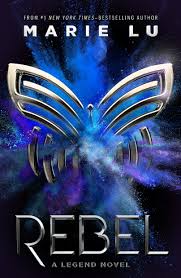
Rebel
Chapter 38: os Angeles: Daniel 5
by Lu, MarieThe chapter opens with Daniel experiencing a fragmented and unsettling dream, blending surreal imagery with painful memories from his past. He recalls a childhood moment when, injured and starving, he returned to his mother’s house after a year on the streets. Bleeding from a knife wound, he hesitates to reveal himself to his family, fearing the Republic’s retaliation. When his brother John finally discovers him, the emotional reunion is cut short by Daniel’s realization that this memory is distorted—John is dead, and the dream shifts to a vision of his younger brother Eden dying from a chest wound.
Daniel’s dream reflects his deep-seated guilt and trauma, particularly his fear of failing to protect Eden. The vivid imagery of Eden’s lifeless body haunts him, symbolizing his unresolved anxiety about his brother’s safety. The dream’s abrupt end jolts him awake, where June comforts him. Her presence grounds him, but his panic lingers, exacerbated by the absence of communication from Eden, who is on a dangerous mission infiltrating Hann’s circle.
The tension escalates as June informs Daniel that Eden’s location signal has disappeared, leaving them with ominous possibilities. The lack of contact suggests Eden may have removed the tracker for safety, the drone may have failed, or—most alarmingly—Hann may have discovered and neutralized it. Daniel’s fear for Eden’s life intensifies, mirroring the nightmare he just endured, as the stakes of their mission become starkly clear.
The chapter masterfully intertwines Daniel’s psychological turmoil with the unfolding crisis, highlighting his vulnerability and unwavering concern for Eden. The dream sequence serves as a metaphor for his relentless dread of loss, while the real-time threat to Eden’s life amplifies the urgency of their situation. The unresolved ending leaves readers anticipating the next developments, underscoring the precariousness of their mission and Daniel’s emotional fragility.
FAQs
1. What are the two distinct parts of Daniel’s dream, and how do they reflect his psychological state?
Answer:
Daniel’s dream consists of two key segments: first, a childhood memory where he returns injured to his brother John for help, and second, a sudden shift where he sees his younger brother Eden bleeding to death on the table. The first part reflects Daniel’s unresolved trauma from his past—his separation from family, survival struggles, and fear of endangering them. The second segment reveals his deep-seated anxiety about Eden’s safety, magnified by Eden’s current mission. The dream’s disjointed nature mirrors Daniel’s fractured emotional state, blending past trauma with present dread.2. Analyze the significance of Daniel’s hesitation before knocking on his family’s door. What does this reveal about his character and circumstances?
Answer:
Daniel’s hesitation underscores his internal conflict between survival and protecting his family. Despite severe injury, he debates revealing himself because the Republic might punish his family for harboring him (“they’ll kill all of you”). This highlights his self-sacrificing nature and the oppressive regime’s reach. His eventual decision to knock—driven by sheer desperation—shows his vulnerability and lingering hope for familial connection, even as he risks their lives. The moment encapsulates his isolation and the cruel choices imposed by the Republic’s tyranny.3. How does June’s interaction with Daniel after his nightmare contrast with his dream experience, and what does this suggest about their relationship?
Answer:
June’s calm, grounding presence (“Hey, you’re okay”) contrasts sharply with Daniel’s chaotic dream. Where his dream is filled with helplessness (John’s death, Eden’s bleeding), June offers stability and silent understanding. She recognizes his fear for Eden without pressing him, showing her emotional attunement. Their dynamic is one of mutual support: June provides pragmatic reassurance (updating him on Eden’s signal), while Daniel trusts her enough to disclose his vulnerability. This underscores their deep bond and shared burden of protecting Eden.4. The chapter ends with June revealing Eden’s location signal is lost. What are the possible implications of this, and how does it heighten the narrative tension?
Answer:
The lost signal suggests three grim possibilities: Eden disabled it for safety, the drone failed, or Hann discovered it. The ambiguity creates suspense, as each scenario carries high stakes—Eden’s capture or death would devastate Daniel and jeopardize their mission. June’s direct delivery (“no sugarcoating”) mirrors the urgency, while Daniel’s unspoken fears (“ominous pit”) amplify dread. This cliffhanger forces readers to grapple with worst-case scenarios, mirroring Daniel’s own spiraling anxiety and setting the stage for a high-risk rescue or confrontation with Hann.
Quotes
1. “They don’t know I’m alive. If I reveal myself to them, how will they react? What will the Republic do to them if they somehow make my family talk?”
This quote captures Daniel’s internal conflict as he debates whether to seek help from his family despite the danger it might bring them. It highlights the oppressive environment of the Republic and the constant fear of retaliation that shapes his decisions.
2. ““It’s me,” I manage to croak out. My hands move aside from my wound to show him the blood soaking my shirt. “Could use some help, John.””
A pivotal moment where Daniel finally reaches out to his brother, John, revealing his survival. This emotional reunion underscores the themes of family bonds and desperation in the face of suffering.
3. “This isn’t real. Because John is dead.”
A jarring realization that shifts the dream into a nightmare, emphasizing Daniel’s grief and trauma over his brother’s death. This moment blurs the line between memory and hallucination, reflecting his psychological turmoil.
4. ““Daniel, there’s no more location signal.””
June’s ominous announcement about Eden’s missing signal heightens the tension and foreshadows potential danger. This quote marks a turning point in the chapter, shifting focus from Daniel’s past trauma to the immediate threat facing his brother.
5. “Hann has discovered and disabled it.”
The chilling conclusion to the chapter, suggesting Eden may be in grave danger. This quote underscores the ever-present threat of Hann and the high stakes of the siblings’ mission.
